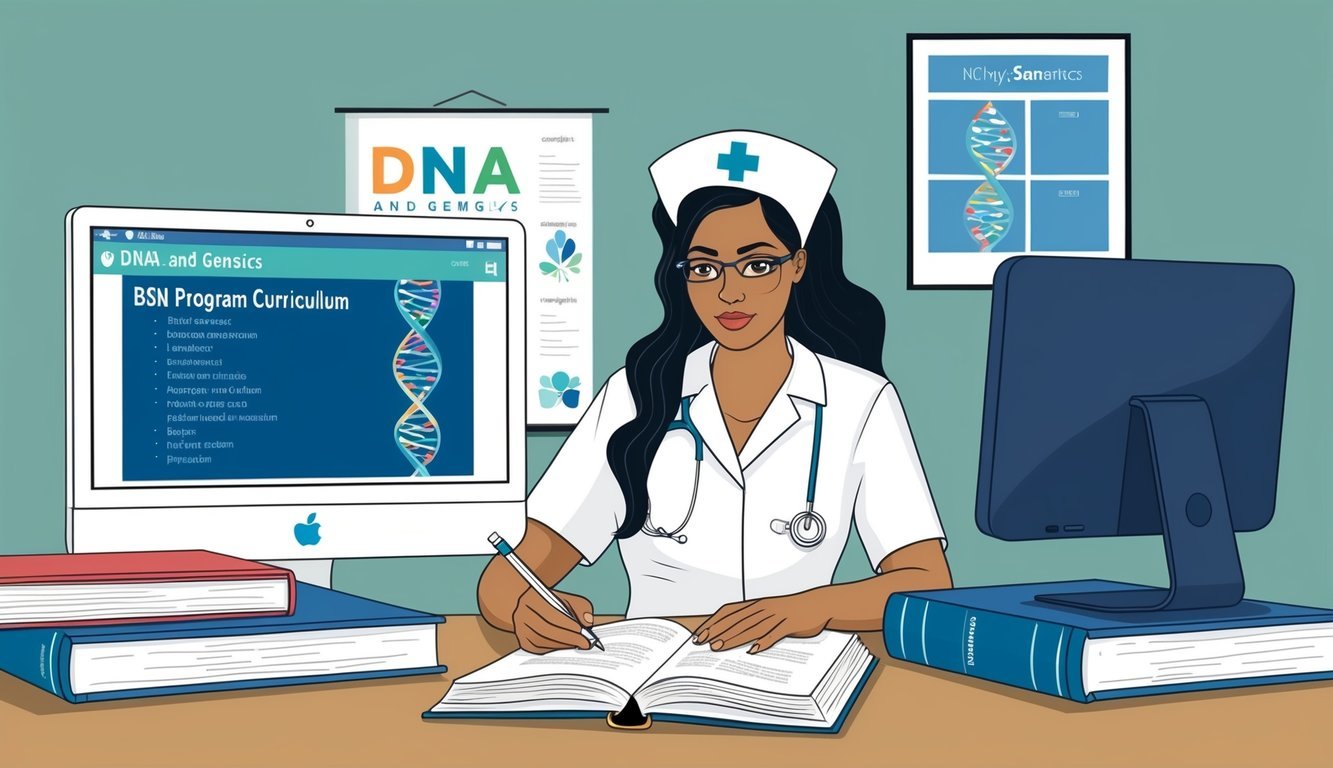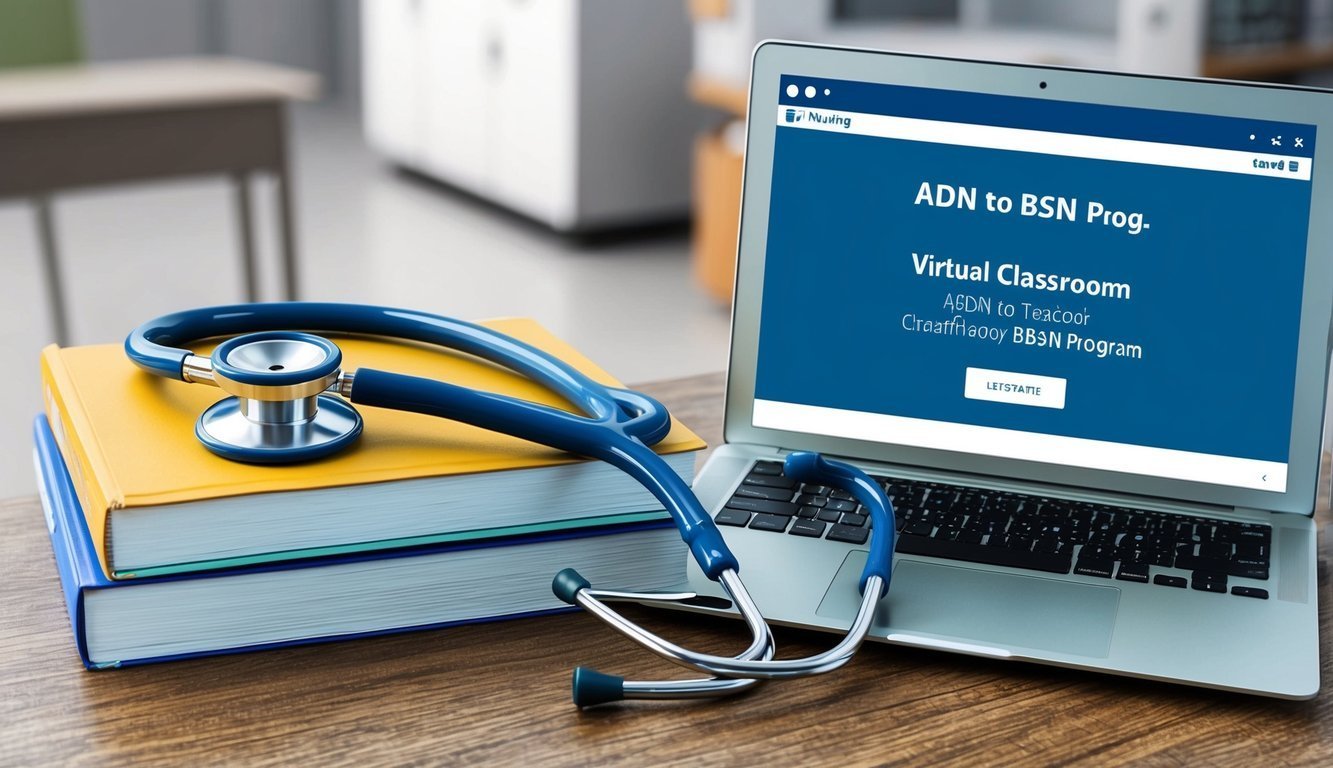The ADN to BSN program is a popular choice for nurses looking to advance their careers.
This program allows you to build on your associate degree in nursing and earn a Bachelor of Science in Nursing, enhancing your skills and job prospects.
Many hospitals and healthcare employers now prefer or require a BSN for nursing positions, making this degree essential for career growth.
As you embark on this educational journey, you will encounter a curriculum designed to deepen your nursing knowledge and clinical abilities.
Many programs now offer flexible online options, allowing you to work while studying.
This flexibility can make it easier to manage both your professional and academic commitments.
With a BSN, you open doors to new opportunities in the nursing field.
Whether you aspire to take on leadership roles, specialize in a certain area, or pursue further education, the ADN to BSN pathway is a significant step toward achieving your goals.
Key Takeaways
- ADN to BSN programs enhance your nursing qualifications and job prospects.
- Many programs offer online options for flexible learning.
- A BSN degree opens up new career opportunities and advancements.
Understanding ADN to BSN Programs

ADN to BSN programs offer Registered Nurses a pathway to advance their education and improve their career opportunities.
These programs focus on enhancing nursing skills while preparing you for leadership roles in healthcare.
Below are the key aspects of these programs.
The Path from ADN to BSN
Transitioning from an Associate Degree in Nursing (ADN) to a Bachelor of Science in Nursing (BSN) involves a structured process.
Your ADN, typically a two-year program, equips you with essential nursing skills.
A BSN program usually takes an additional two years and includes advanced nursing topics.
During this journey, you will take classes in areas such as leadership, community health, and research methodologies.
You can pursue ADN to BSN programs online or in person, with many colleges offering flexible schedules to suit your needs.
Benefits of Obtaining a BSN
Earning a BSN can significantly enhance your career opportunities.
Nurses with a BSN often receive higher salaries compared to those with an ADN.
For instance, the average salary for BSN graduates can be about $92,000, while ADN holders might earn around $75,000.
Furthermore, a BSN prepares you for leadership roles.
Many healthcare facilities prefer or require a BSN for management positions.
Completing a BSN can also provide a foundation for further education, such as a Master’s in Nursing.
Admission Requirements for BSN Programs
To enter a BSN program, you typically need to meet specific admission requirements.
First, you must hold a valid ADN and an RN license.
Schools may also require a minimum GPA and completion of certain prerequisite courses like microbiology or anatomy.
Some programs may ask for letters of recommendation or a personal statement.
It’s essential to check each program’s unique requirements since they can vary between institutions.
Overview of RN License and NCLEX
Once you complete your ADN, you’ll need to pass the NCLEX-RN exam to obtain your RN license.
This exam tests your knowledge and skills to ensure you are ready to practice safely and effectively.
After passing the NCLEX-RN, you can work as a Registered Nurse.
If you later decide to pursue a BSN, your RN status often makes you eligible for ADN to BSN programs, allowing for a smoother transition into advanced nursing roles.
Be sure to research your state’s licensing requirements, as they can differ.
BSN Program Curriculum and Clinical Requirements
In a BSN program, you will encounter a blend of core nursing courses, evidence-based practices, and hands-on clinical experiences.
These components are essential for building a strong foundation in nursing and ensuring that you are prepared for real-world challenges in healthcare settings.
Core Nursing Courses and Specialties
In your BSN program, core nursing courses typically include subjects like microbiology, pathophysiology, and anatomy and physiology.
Each of these areas provides critical knowledge that you will apply in patient care.
You may also have the opportunity to explore nursing specialties.
These might cover topics such as pediatric nursing, mental health nursing, or community health.
Each specialty allows you to focus on specific aspects of nursing that interest you.
Here’s a sample list of core nursing courses:
| Course Name | Credit Hours |
|---|---|
| Microbiology | 4 |
| Pathophysiology | 3 |
| Anatomy and Physiology | 4 |
| Nursing Theory | 3 |
| Leadership in Nursing | 3 |
These courses, combined with your previous nursing education, contribute to your total credit hours required for the degree.
Incorporating Evidence-Based Practice
Incorporating evidence-based practice (EBP) is a vital aspect of the BSN curriculum.
You will learn to critically evaluate research and apply findings to patient care.
This skill enhances the quality of nursing practice and patient outcomes.
As part of your coursework, you will participate in assignments that require analysis of current research.
You may review studies on effective nursing interventions or health policies.
Learning to integrate EBP will prepare you for making informed decisions in your nursing career.
Familiarity with resources such as Nursing World can help you stay updated with the latest practices and guidelines.
Clinical Hours and Real-World Experience
Clinical hours are an integral part of the BSN program.
Most programs require a specific number of clinical hours, often ranging from 500 to 1,000 hours, depending on the institution.
During these hours, you will gain hands-on experience in various healthcare settings.
This exposure allows you to apply what you’ve learned in the classroom to real-life situations.
You will work alongside experienced nurses and healthcare professionals, further enhancing your skills.
Transfer credits from your previous ADN or nursing diploma may help you meet clinical hour requirements.
Always check with your program to see what credits can transfer, as this may streamline your path to graduation.
Online BSN Program Structures

When considering an online BSN program, it’s crucial to understand the structure and key components that can affect your educational journey.
You will explore various online nursing degree options, the importance of accreditation, and the benefits of balancing your studies with work commitments.
Exploring Online Nursing Degree Options
Online nursing programs offer flexibility for students pursuing a Bachelor of Science in Nursing (BSN).
Many institutions, such as WGU and Arizona State University, provide diverse pathways.
These options can include:
- Concurrent Enrollment: Programs that allow you to work on your Associate Degree in Nursing (ADN) and BSN at the same time.
- Traditional Online BSN: Designed for RNs with an ADN to transition to a BSN in a structured format.
Courses typically focus on leadership, evidence-based practice, and community health.
You will likely find programs structured to accommodate various learning styles through interactive online learning platforms.
Ensuring Quality Through CCNE Accreditation
Accreditation is vital for ensuring your online nursing degree holds value.
Programs accredited by the CCNE (Commission on Collegiate Nursing Education) meet specific standards of education and quality.
This accreditation:
- Validates the program curriculum.
- Increases employment opportunities.
- May be required for further education, such as a Master’s Degree.
When researching programs like those at Herzing University, check for CCNE accreditation to ensure you receive a recognized education in your BSN studies.
Balancing Education with Work Using Online Classes
One of the main advantages of online BSN programs is the ability to balance work and study.
Online classes allow you to choose when and where to complete your coursework.
Here are some tips for managing both effectively:
- Create a Schedule: Set aside specific times for studying to maintain consistency.
- Utilize Resources: Take advantage of online tools provided by your program, such as discussion boards and study guides.
- Communicate with Employers: Let your employer know about your study commitments, which may lead to supportive arrangements.
Programs designed for working RNs, like those offered at WGU, focus on a flexible schedule to help you succeed.
Career Advancement with a BSN Degree
A BSN degree can significantly enhance your career in nursing.
With improved skills and knowledge, you gain access to better opportunities, leadership roles, and increased earnings potential.
Here’s how a BSN can impact your career.
Navigating Nursing Career Opportunities
With a BSN, you stand out in the competitive job market.
Many healthcare facilities prefer or require a BSN for registered nursing positions.
This degree opens doors to various roles beyond traditional patient care.
You can explore opportunities in areas such as:
- Healthcare Administration
- Nurse Education
- Public Health Nursing
- Research
According to the Bureau of Labor Statistics, RNs with a BSN are in high demand.
Employers seek professionals who can take on more complex responsibilities that include patient education and health promotion.
Leadership Roles and Management Skills
Earning a BSN equips you with essential leadership skills.
You learn about healthcare policies, ethics, and effective management strategies.
This knowledge prepares you for roles that involve coordinating patient care and leading teams.
Key areas of focus in BSN programs include:
- Nursing Leadership
- Quality Improvement
- Interprofessional Collaboration
These skills are crucial for positions such as Nurse Manager or Clinical Nurse Leader.
With a BSN, you are more likely to advance to nursing administration roles, shaping patient care and healthcare practices.
The Impact of a BSN on Earnings and Job Security
Holding a BSN can positively influence your salary.
Registered nurses with a BSN tend to have higher earning potential than those with just an ADN.
Average salaries for BSN-prepared nurses can be significantly higher, depending on the role and location.
| Position | Average Salary |
|---|---|
| Registered Nurse (ADN) | $65,000 |
| Registered Nurse (BSN) | $75,000 |
| Nurse Manager | $85,000 |
Additionally, a BSN provides greater job security.
Many organizations prioritize hiring BSN-prepared nurses, especially as healthcare standards evolve.
This preference enhances your ability to secure stable and rewarding positions.
By pursuing a BSN, you invest in your future and unlock numerous career advancement opportunities in nursing.
Financial Considerations and Support

When transitioning from an ADN to a BSN program, it is essential to understand the costs involved and the financial aid options available.
Knowing how to calculate your credits and the length of the program can help you plan your finances effectively.
Understanding Tuition and Financial Aid Options
The institution’s tuition for a BSN program varies widely.
On average, you might expect to pay between $15,000 and $40,000 for the entire degree.
Make sure to use a tuition calculator to estimate your specific costs based on your chosen school.
Financial aid is available through grants, scholarships, and loans.
You should fill out the FAFSA to determine your eligibility for federal aid.
Many nursing schools also offer scholarships specifically for students in nursing programs, which can significantly lower your costs.
Always check with your financial aid office for available options.
Calculating Credits and Program Length
Most BSN programs require around 120 credits to graduate, although the exact number can vary.
If you have already completed an ADN, you may receive credit for some courses.
Check with your school to see which credits transfer.
Typically, full-time students can complete the BSN in two to three years.
However, part-time options are available that allow for a more flexible schedule.
Make sure to verify how your institution outlines these paths and any prerequisites needed to ensure a smooth transfer.
Frequently Asked Questions
You may have several questions about the ADN to BSN program.
Below are some common inquiries and clear answers to help you understand this educational path in nursing better.
What are the typical admission requirements for an ADN to BSN program?
Admission requirements can vary by program, but common criteria include:
- A valid Associate Degree in Nursing (ADN)
- A current nursing license (RN)
- Minimum GPA, usually around 2.5 to 3.0
- Completed prerequisite courses
Make sure to check specific programs for exact requirements.
How long does it typically take to complete an ADN to BSN program?
Most ADN to BSN programs take around 12 to 24 months to complete.
This timeframe may vary based on several factors, such as:
- Your course load (full-time vs. part-time)
- Program structure (accelerated options)
You can choose programs that fit your schedule and goals.
What is the average cost of enrolling in an ADN to BSN program?
The cost can differ widely based on the institution and location.
On average, you may expect to pay between $10,000 and $30,000 for the entire program.
Costs often include:
- Tuition
- Fees for materials
- Clinical training expenses
Consider looking into financial aid options or scholarships.
What are the advantages of having a BSN over an ADN in nursing?
Holding a BSN can offer several advantages such as:
- Better job opportunities in various healthcare settings
- Higher earning potential
- Greater chances for advancement in nursing roles
Many employers prefer or require a BSN for management positions.
Are there accelerated options for completing an ADN to BSN program?
Yes, many institutions offer accelerated ADN to BSN programs.
These programs can allow you to finish in as little as 12 months.
Factors that help speed up your studies include:
- Transfer of prior credits
- Intensive course schedules
Research programs that match your timeframe and needs.
How do online ADN to BSN programs compare to traditional on-campus programs?
Online ADN to BSN programs offer flexibility but may vary in quality.
Key points to consider are:
- Convenience of studying from home
- Schedule management
- Access to virtual resources
On-campus programs provide in-person experiences and may have more direct interaction with faculty and peers.
Both formats can lead to a successful career, so choose one that fits your lifestyle.

